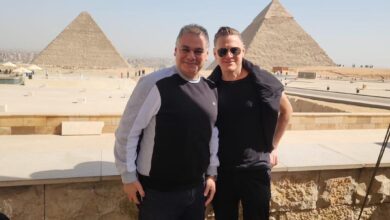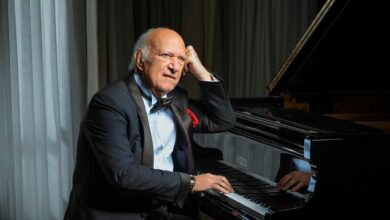“Back Down Mubarak!” is in essence what millions of protestors have been chanting in a unified voice for the 18 days that the revolution lasted. But it’s also an upbeat rap song penned and performed by UK’s rising star of hip-hop Master Mimz, who released her track honoring the Egyptian people’s fight for democracy.
Myriam Bouchentouf, alias Master Mimz, is an interesting character indeed. Born in Casablanca in 1985, she started listening to hip-hop artists at a very early age. “I started at the age of 5 and my passion has continued to increase over time,” Mimz explains to Al-Masry Al-Youm. Her childhood and adolescence were lulled by tracks of Notorious B.I.G., Jay-Z, the Fugees, Salt N’ Peppa, Lil Kim and Queen Latifah, all trademark performers of the late 80’s and 90’s. “At the time there were no Moroccan rappers that I knew of, and I felt naturally drawn to an American-centric type of hip-hop,” she explains.
Encouraged by her family to study a serious curriculum, she complied and moved to Montreal, Canada to pursue a bachelor in economics at McGill University.
“When you grow up in Morocco, you are encouraged to study law, engineering or accounting,” she says. “Very hard science is seen as the safest route, and I did that.”
She moved to London in September 2010 to pursue her masters degree at London School of Economics and Political Science and made a discovery in the UK’s capital that changed the course of her career: a hip-hop karaoke in the basement of a London club. “I went down there for the first time in November, and performed on stage Jay-Z’s ‘Big Pimpin’. It was a huge success.”
Week after week, Mimz performed on stage for an exponential number of followers, who insisted that she should start seriously considering a career as a rapper. With the modesty that characterizes her, she told Al-Masry Al-Youm: “I knew I could rap along and keep the rhythm but you don’t think of yourself as a rapper, just like someone who sings in the shower!”
One night, UK rap-producer Sterling Reigns addressed her and complimented her on her flow. “He told me that he was working on a collaborative rap album and offered me (the chance) to participate and visit his studio.” Three weeks later, they had recorded 12 tracks of the album, which is scheduled for release in 2011. Their debut single “I C U (Rub Off)” is already available on YouTube and iTunes.
On the 1 February, only ten days before Mubarak’s resignation, Master Mimz released “Back Down Mubara,” which she introduced on her Facebook profile page with these words: “YOU CAN'T STOP 80 MILLION ANGRY PEOPLE!! AND NOW WE HAVE THE NEW ANTHEM! THIS IS MY FREESTYLE ON EGYPT CALLED "BACK DOWN MUBARAK”!! LET'S KEEP THE MOVEMENT ALIVE!! #EGYPT.”
With powerful lyrics–everybody stomp your feet/tired of being chewed like meat/call it Jasmine revolution/lost world we are the solution/this shit don’t smell like a flower/it’s the rise of people power–and an acrobatic rap flow, Master Mimz shook the hip-hop scene with her tough vision on the revolutions in the Arab world.
“It took me less than two hours to write the lyrics of this song,” says Mimz. “I was completely in the moment, glued to my TV 24/7.”
She explains that she was immediately drawn to the events as soon as they started unfolding. “It has to do with the fact that I can relate to the region in general and to the Egyptian people in particular. As a Moroccan I grew up watching Egyptian movies, listening to their music and their TV shows.”
At a later age, when she moved to Canada and London, she met a lot of Egyptians and became familiar with the issues they were facing.
“As an artist, I felt a responsibility to voice the frustrations of the Egyptian youth in order to give a human perspective on the events. I also thought that rapping in English would give it a broader audience,” she explains.
But she is not willing to label herself a “political rapper” per se. In fact, she insists that she wants to rap on whatever issue or feeling seems relevant to her and her generation, but refuses to be pigeon holed into any one category.
“It’s funny how this question about me being a political rapper emerged after ‘Back Down Mubarak.’ But to me, more than a political issue, the Egyptian revolution was a human issue,” she says.
She admits that rap has been at the forefront of the Egyptian revolution, and according to her “it is because originally rap music has developed in an oppressive background in the South Bronx in the 1970’s, and it was all about protest, trouble and struggle.”
According to Mimz, the rappers from the Middle East have managed to keep the essence of the old-school American hip-hop. In the Middle East, hip-hop has been very popular for the past ten years and she finds it “amazing to see how many talented young rappers have budded all over the region. I would like to mention particularly Bigg “Tha Don” from Casablanc, who is my favorite Arab rapper, and Shadia Mansour, a Palestinian born UK rapper who sings in Arabic.”




